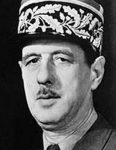 Charles de Gaulle (1890-1970) was a French military commander and politician. He served as France’s defence minister, prime minister and president during the Cold War. De Gaulle was born in Lille, northern France, and was the son of a prominent history professor. As a boy, he showed an avid interest in history, particularly military history. De Gaulle enrolled at the Ecole Militaire, France’s foremost military academy, and graduated in 1912. He was commissioned in the French army and became a protégé of future commander Philippe Pétain. In 1914 de Gaulle was thrown into action as a platoon commander in World War I. He was wounded and captured at the Battle of Verdun (1916) and spent the rest of the war as a German prisoner. He remained in the army after his release, serving in Poland and French-occupied Rhineland, then as a staff officer. During World War II de Gaulle led Free French Forces against both the Nazis and their collaborators, the Vichy French. Though based mainly in London, de Gaulle’s relationship with his British and American allies was often prickly, in part because of his own personal mistrust and demeanour.
Charles de Gaulle (1890-1970) was a French military commander and politician. He served as France’s defence minister, prime minister and president during the Cold War. De Gaulle was born in Lille, northern France, and was the son of a prominent history professor. As a boy, he showed an avid interest in history, particularly military history. De Gaulle enrolled at the Ecole Militaire, France’s foremost military academy, and graduated in 1912. He was commissioned in the French army and became a protégé of future commander Philippe Pétain. In 1914 de Gaulle was thrown into action as a platoon commander in World War I. He was wounded and captured at the Battle of Verdun (1916) and spent the rest of the war as a German prisoner. He remained in the army after his release, serving in Poland and French-occupied Rhineland, then as a staff officer. During World War II de Gaulle led Free French Forces against both the Nazis and their collaborators, the Vichy French. Though based mainly in London, de Gaulle’s relationship with his British and American allies was often prickly, in part because of his own personal mistrust and demeanour.
In August 1944, as the Nazis were being pushed out of France, de Gaulle became the nation’s provisional president. He would continue to shape French affairs for the next 25 years. In December 1944 de Gaulle visited Moscow and held amicable talks with Joseph Stalin, culminating in the signing of a treaty. Though sceptical about Stalin’s real intentions, de Gaulle harboured grand visions of post-war France. Hoping to restore France as a world power, de Gaulle imagined his country as a buffer state and intermediary between Moscow and the West. He also wanted to regain control of France’s colonies, an objective that failed dramatically. In late 1945 de Gaulle deployed troops to Indochina (Vietnam) to reclaim French colonial possessions there. This triggered the First Indochina War against the nationalist Viet Minh, ending with a disastrous French defeat in 1954. This was followed by a costly war of independence in the northern African colony of Algeria (1954-62).
In the late 1950s de Gaulle served as France’s defence minister and prime minister. He remained a nationalist who placed French interests first and tried to steer his own course in the Cold War. In 1956 de Gaulle initiated a program to research and develop nuclear weapons; France’s first successful atomic detonation would come in February 1960. De Gaulle was comprehensively elected as president in November 1958, winning more than three-quarters of the vote. As president he cultivated good relations with West Germany, signing a peace treaty in January 1963. He also opened negotiations with the Soviet Union, visited Moscow and signed trade agreements with the Soviets. Always wary of having France foreign policy determined by others, de Gaulle withdrew from NATO in June 1966, despite the key role France had played in forging the alliance. He also ended France’s involvement in the South East Asia Treaty Organisation (SEATO) and opened up diplomatic relations with communist China.
Within his own country Charles de Gaulle continued to command significant respect as a military hero, wartime leader and statesmen – however by the late 1960s, many French saw him as yesterday’s man, too inflexible and conservative to embrace reform. De Gaulle resigned the presidency in April 1969, after his proposals to restructure the government were defeated in a referendum. He retired to his country estate to write his memoirs. Charles de Gaulle died in November 1970, aged 80.
Content on this page is © Alpha History 2018-23. This content may not be republished or distributed without permission. For more information please refer to our Terms of Use.
This page was written by Jennifer Llewellyn and Steve Thompson. To reference this page, use the following citation:
J. Llewellyn & S. Thompson, “Charles de Gaulle”, Alpha History, accessed [today’s date], https://alphahistory.com/coldwar/charles-de-gaulle/.
